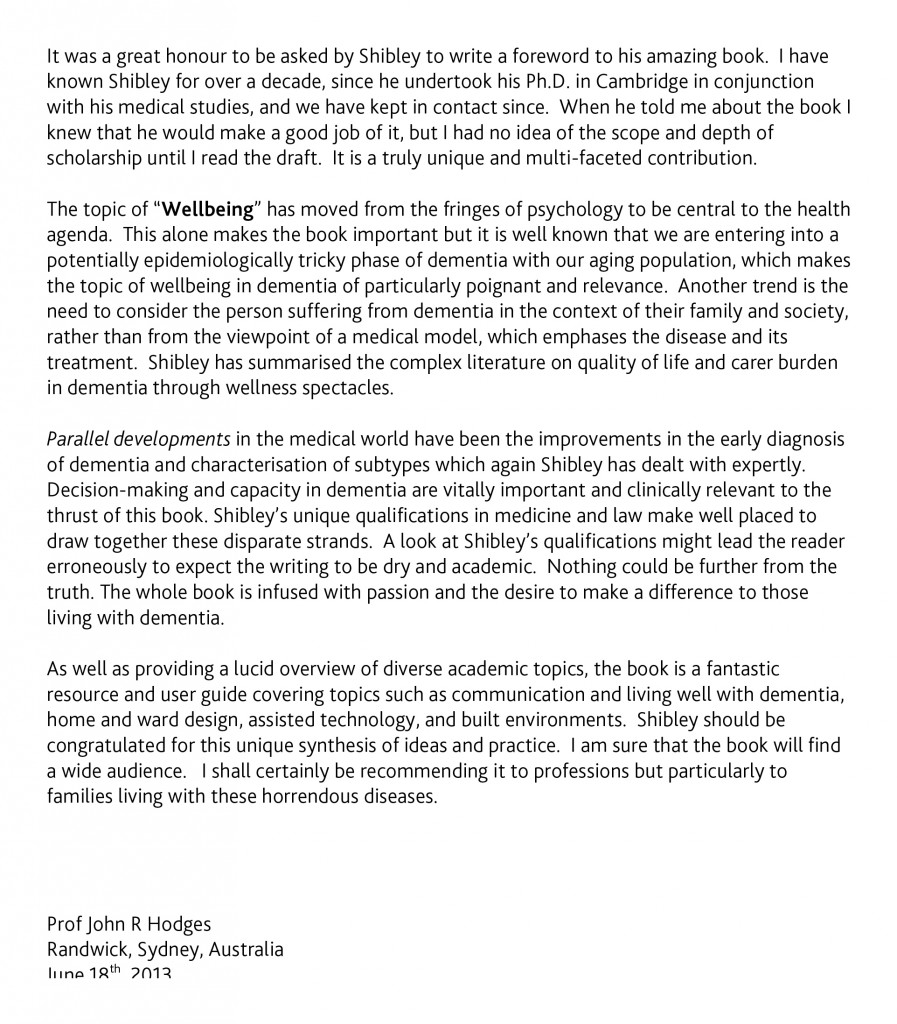Home » Posts tagged 'Oxford'
Tag Archives: Oxford
Foreword by Prof John Hodges
This is the Foreword to my book entitled ‘Living well with dementia‘, a 18-chapter book looking at the concept of living well in dementia, and practical ways in which it might be achieved. Whilst the book is written by me (Shibley), I am honoured that the Foreword is written by Prof John Hodges.
Prof Hodges’ biography is as follows:
John Hodges trained in medicine and psychiatry in London, Southampton and Oxford before gravitating to neurology and becoming enamoured by neuropsychology. In 1990, he was appointed a University Lecturer in Cambridge and in 1997 became MRC Professor of Behaviour Neurology. A sabbatical in Sydney in 2002 with Glenda Halliday rekindled a love of sea, sun and surf which culminated in a move here in 2007. He has written over 400 papers on aspects of neuropsychology (especially memory and languages) and dementia, plus six books. He is building a multidisciplinary research group focusing on aspects of frontotemporal dementia.
Lawyers and alcohol
I have a huge interest in the effects of problem drinking and addiction to alcohol, and in recovery. However, a bit like my other interest disability, there’s a limit to how many ‘white elephants’ I can talk about in relation to the legal profession, otherwise the ‘white elephant’ in currency terms will become devalued. Notwithstanding that, lawyers who have a drink problem do need medical help, I feel. It’s probably true that the vast majority of lawyers and law students know how to have a social drink, and shouldn’t be unfairly stigmatised for doing so.
Like London buses, nothing was in eyesight, until several sightings came along at once recently for me. Alex Aldridge on Monday set the ball rolling with his article in the Guardian, “Law’s problem with alcohol is slowly being addressed – but is still hush-hush“. The article explains elegantly how drinking is indeed said to be part of the culture in deal-making particularly in the City, but also explains how there may be a spectrum of lawyers from ‘law anoraks’ who are driven by academic results to those with severe dependence problems. It is my belief that true alcoholics are those people who do not know how to stop at one drink, so will nearly always keep going until something catastrophic occurs. On Thursday, Paul Venton, Chairman of LawCare, wrote a truly terrific piece in the Law Gazette entitled, “A heartfelt thanks”. Paul writes, “On many occasions, the assistance we have been able to provide to those afflicted by the curses of drug or alcohol dependency, or the debilitating effect of stress in their lives, has avoided personal and practice tragedies and the wider ramifications they entail.”
I believe robustly that those with true dependency problems will need to spend a life in recovery for their own safety, but for individuals with mild problems more bespoke medical help may be suitable. This is one person’s view, and not advice to other law students or practising lawyers. On Wednesday evening, I was gripped by a lecture by Prof David Nutt, @profdavidnutt, an academic who was sacked as being the Government’s advisor on drugs by the last government but who is now Chair of the Independent Scientific Committee on Drugs. In a pleasant chat after the lecture, held at the Pitt Rivers Museum at the University of Oxford, I suggested to him that a team of his PhD students or postdocs should look at the frequency of ‘alcohol’ appearing in the Part II of death certificates in the UK, and examining whether this tallied up with the prevalence or incidence of alcoholism in vivo in the UK.
Prof Nutt interestingly provided that he had found the Liberal Democrats the most in line with his personal views about the tone of regulation. His lecture, chaired by Prof Guy Goodwin from the University of Oxford Warneford Hospital for psychiatry, described how the Misuse of Drugs Act 1971 was not ‘fit for purpose’, the Dutch cafe experiment, how the harm from alcohol was often much more than from other drugs, how alcohol abuse was globally a cause of disability according to WHO, how alcohol was recently not allowed even through necessity for medicinal purposes, the distinction between legalisation and decriminalisation (in the Q/A session afterwards), “equasy”, and how Francis Crick is alleged to have dreamt up the structure of DNA, amongst many other issues. It was obvious that Prof Nutt felt the debate about the regulation of drugs had been stifled in recent years, but strongly urged people to keep up-to-date with the latest developments on his blog, particularly since reports in the media were so unreliable.
"Paranoid android" by Weezer

I will be going to the Royal Horticultural Society’s Flower Show this morning. Several years ago, I went to see Radiohead live, and they played of course their anthem “Paranoid android”. A wonderful song – I asked a colleague of mine what the song was when I heard it in the opening sequence of an episode of the last series of “Dr. House”. “Paranoid android” by Weezer is currently trending in London, so I am proud to put it on my personal blog.
Good luck to the Light Blues!

Cambridge University’s crew is favoured to beat Oxford University tomorrow in one of the U.K.’s oldest sports contests, an event that generates more wagers than Olympic rowing, according to William Hill, in its fourth consecutive win.
The budget
I have a terrific regard for the University of Oxford and the PPE course (Politics, Philosophy and Economics).
As an educationalist, I think it is a very clever combination of three subjects taught to a hugh standard by three separate examination schools. However, as a neuroscientist, I think the subject is ahead of its time. For me, it represents whether the markets operate with free will or deterministically, and whether its expedient for governments to make decisions around such findings, inter alia. And the list of PPE graduates is a wonder to behold: Andreas Whittam-Smith, Guto Harri, Mary Ann Sieghart, Nick Cohen, Nick Robinson; and of course, Stephanie Flanders, Hugh Pym and Ed Balls. I was disappointed, but not particularly surprised, to see George Osborne not on this list.

With the ritualistic nature of the Budget, it is easy to forget that the budget for any business entity represents the pivotal focus of budgeting (as the name would imply) and forecasting. This is interesting in the context of the overall business strategy, and provides an important exercise for seeing the progress of the organisation with its economic goals. In summary, we saw inflation go up to 4.4% yesterday, GDP is going down (although hopefully it is likely we will avoid a ‘double dip’ of two quarters of negative growth seeing us back into recession), unemployment rising particularly youth unemployment, and interest rates probably about to go up. The danger with the cuts strategy, of cutting quite so much fast so fast, was that we would risk slow growth, with people being laid off in the public sector with the private sector not picking up the slack, as the Tory-led government had hoped. This would mean there would be less spending power, more unemployment benefit being paid, less tax revenue, and the deficit actually not being cut as fast as desirable. It is also incredibly depressing for morale. Many of us have felt that even if the deficit is paid off fast the wreckage that would be produced socially would be difficult to recover from. Hence, we at Cambridge, have a somewhat different emphasis. We don’t call it “Politics, Philosophy and Economics”, but “Social and Political Sciences”. You’ll see this perhaps this Saturday…
Angela Eagle MP must be a future Shadow Chancellor
There is no doubt for me that Angela Eagle MP will be a future Shadow Chancellor of the Exchequer at some time. Whilst the media is making much play of the fact that Alan Jonhson MP is boning up on his primer in macroeconomics, Angela Eagle MP, with her degree in PPE from Oxford, could be the perfect politician in future to take the economic arguments to the experts.
She also very much does human, and clearly knows how to relate to our potential voters.
It could be that Ed Balls MP brings too much baggage, as a ‘Brownite’ in terms of the implications of economics policy. For example, his opposition to foundation hospitals is an obstacle to the debate on ‘marketisation’ of the health service which is about to be discussed by the Conservatives. It would have been extremely difficult to assume the mantle of Shadow Chancellor under the circumstances, and I also feel that Alan Johnson MP is the right man for the job presently. These cuts are deadly serious!










